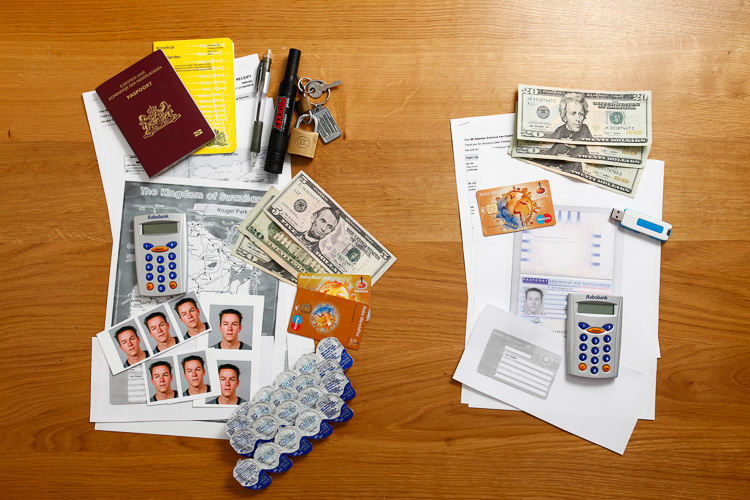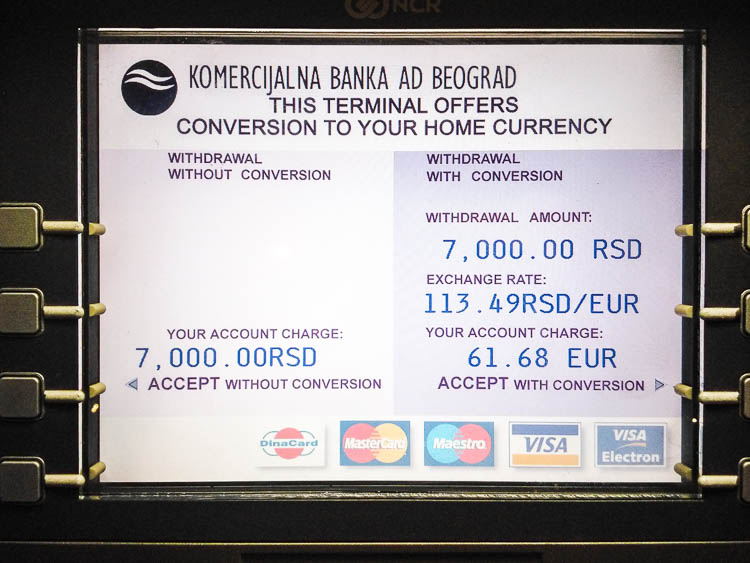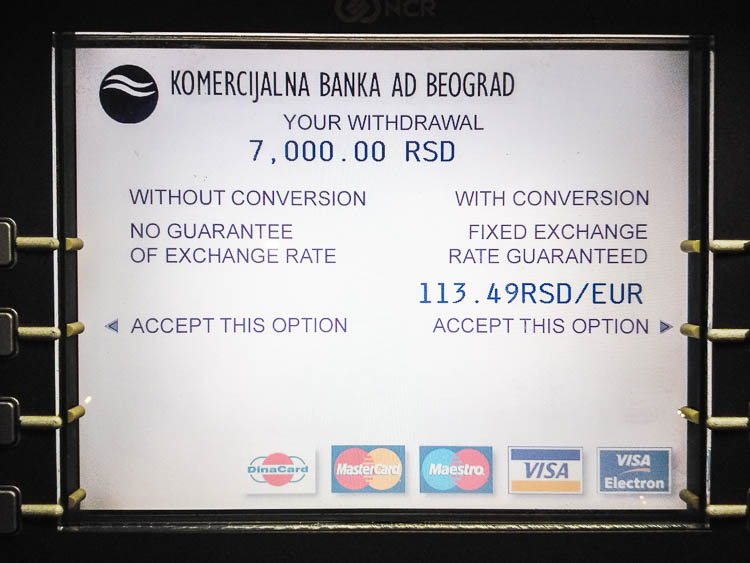
What if you’re at the airport and the ATM refuses to give you some cash? How about that time when you lost €100 to that corrupt police officer? And what about all that fiddling with your wallet out on that street market with all those people around you? There surely must be a better and safer way to handle cash abroad? Based on my own experiences, these are my 10 crucial tips on how to keep your travel cash safe!
1. Don’t carry too much
Unless you really have to, try to keep minimal cash with you. I rarely take more cash than I need for a day and leave the rest somewhere else. Even when I went to Iran and needed to take all money with me for the next three weeks, I kept most of it hidden away at my accommodation. Same goes for Transnistria.
Due to transaction costs it sometimes does make sense to take larger sums of money at once, but what I then do is to try and already pay in advance for certain things (if paying by card was no option). The longer you carry large sums of money, the higher the risk of losing it.
Another reason not to carry too much cash on you, is when dealing with corrupt police officers. What they usually do is they strip you from top to bottom so they know exactly what you have on you, and then they force you to hand over your money. While the best thing would be not to give anything, imagine yourself carrying hundreds of dollars. In that case it would be very hard to keep your cool because all you want is to get out! That takes some experience that most travellers (understandably) do not have! I experienced a situation myself in Mozambique, but I was already prepared for it and had about €5 with me (nothing else, not even a passport but rather an official copy). I later heard stories of people who handed over their complete wallets because the officers had taken their passports.
2. Carry only small cash
Whenever you do carry cash, carry only small cash. Try to break up large bank notes into smaller ones as soon as possible and get some coins to pay for the usual things as you go. Imagine you want to try some street food somewhere in Asia but you only have a bank note that will pay for 200 meals… Also, to avoid any taxi scams it is best to pay with exact money so you would need to have some small cash.
3. Leave your wallet out of sight
This is perhaps the most important tip of all. While some choose to carry money belts, I never felt like doing so simply because I am not used to it (which I believe increases my risks of making mistakes with it). What I have found, is that I always try to keep my wallet out of sight, somewhere deep down my backpack or so and always pay from the small cash in my pocket (see tip 2). Before I step out of a bus, I have transferred some fresh cash from my wallet into my pocket. Same when I sit somewhere quiet in a restaurant, it is the ideal time to grab my wallet and replenish my right pocket with some small cash. I very rarely take out my wallet on the streets, and when I do so I usually scan the environment before.
4. Always keep a backup
All the serious travellers that I know travel with multiple bank cards, possibly a credit card and backup cash. They keep it in multiple places to spread the risk of losing everything at once and usually only keep one card with them at the same time. This is the way to go. Myself I keep about 50 dollars or euros in my big backpack as a back up just in case. I used it a couple of times, for example in Japan when all banks stopped working for a few days and when I ran into problems on a Malaysian island. With 50 dollars I found you can easily survive for a few days.
5. Manage your bank account
Before I travel, I make sure that there is not too much cash on my bank account. I spread it around on other accounts so that in case one of my cards goes missing, others will never be able to withdraw large amounts. I know how some people lost their cards and found out the day later that more than €500 went missing. I rarely have more than €100 on it when I am able to regularly replenish my account with Internet banking anyway. Also, with internet banking I can control in which world regions my cards are activated, which adds another layer of safety. Do make sure though that you activate the region before you go there!
6. Carry emergency phone numbers
I always carry the emergency number of my local bank office. In case one of my bank cards goes missing (or I feel like the card got skimmed), I can then immediate block it. I experienced that situation when I ran into the earlier mentioned problem in Malaysia, only at that time I had to call my parents to help me out (also works, as long as they can look up the number too).
7. Know about the dynamic currency conversion scam


This scam is actually not a scam, but it can still harm your budget as it lets you pay extra on foreign currency charges at certain ATMs. I have encountered this dynamic currency conversion in airports and other places, but I was aware of it beforehand.
The screen that will pop up will look like the ones above (I photographed these in Skopje, Macedonia). The trick is to always accept withdrawal WITHOUT conversion. This ‘scam’ was featured some years ago on the Dutch investigative TV show Kassa. They sent some students around Europe and showed how they sometimes got charged up to 10% of the total withdrawal amount! So be aware, this ‘scam’ is widely found at airports around eastern Europe.
8. Check the layout of the keypad on the ATM
This tip comes from a friend of mine who had his card blocked while abroad. While he was in Hong Kong he never noticed how the keypad had a different layout than the keypad in his home country. He attempted the right pattern three times, but ultimately dialed the wrong numbers. I hope he carried some backup cash…
While I have been in Hong Kong twice myself I never experienced this issue, but indeed I later noticed how the keypads are different among regions. The advice here is to just always pay attention when using an ATM. Not only when using the keypad, but also by checking for example if there are no weird plastic parts sticking out that could indicate a skimming device was installed over the ATM.
9. Keep your credit card in sight
I have heard stories of people handing out their credit cards to pay for some bills and then receiving a fake, similar looking card back. Without checking the card again, they put it back in their wallet only to find out days later that lots of money went missing. Always leave your credit card in sight, and in case you have no other way just check if you received the original card back!
10. Be cautious when exchanging money on the streets
In most cases it’s perfectly fine to exchange money on the streets because in specific situations it might provide much better rates than the ATMs will. When for example the Ukrainian Hryvnia officially peaked at 1:22, the currency offices where already doing 1:26. The same situation applied for me in Iran (1:13 compared to 1:50!) and I also heard about a similar situation in Argentina.
However, always be cautious with men operating on the streets as they might be quick to conceal a few notes as you hand them over. Count your money before and check the calculations yourself! If you are dealing with multiple foreign currencies, always use the XE currency app! And remember, always be cautious for scams!